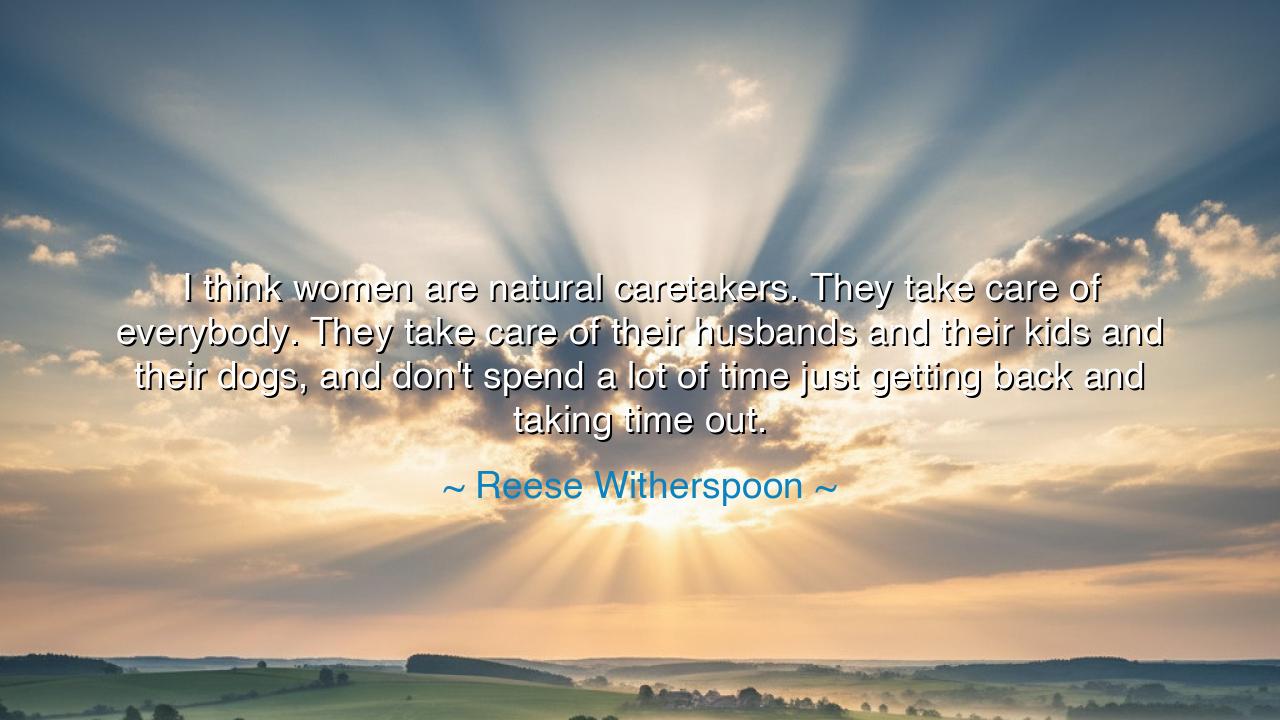
I think women are natural caretakers. They take care of
I think women are natural caretakers. They take care of everybody. They take care of their husbands and their kids and their dogs, and don't spend a lot of time just getting back and taking time out.






“I think women are natural caretakers. They take care of everybody. They take care of their husbands and their kids and their dogs, and don’t spend a lot of time just getting back and taking time out.” Thus spoke Reese Witherspoon, an artist of our age who, through her words, reaches into one of the oldest truths of humankind: that women, by nature and by nurture, carry upon their shoulders the quiet labor of love. Her statement, though gentle and modern in phrasing, echoes an ancient wisdom—that the heart of a woman is a vessel of care, self-sacrifice, and strength so constant that the world often forgets the cost of its constancy.
In her reflection, Witherspoon reveals a dual truth: that caretaking is both a woman’s gift and her burden. From the dawn of time, women have been the weavers of life’s fabric—tending to the young, nursing the sick, comforting the weary, and sustaining the home. They have stood as the hearth’s eternal flame, their compassion steady even when the winds of hardship blew. Yet, as she laments, the same instinct that drives a woman to care for others too often leads her to neglect herself. The world takes her service for granted, and she, in turn, forgets that she too is worthy of rest, joy, and renewal.
To call women “natural caretakers” is not to confine them to servitude, but to recognize the sacred rhythm that flows through their being. Nature itself mirrors this truth: the earth nourishes all creatures and asks for nothing but balance in return. The sun gives its warmth without counting the cost. Yet even nature, in its wisdom, knows the need for cycles of rest—the winter after the harvest, the night after the day. So too must the caretaker learn to pause, to replenish the spirit that fuels her giving. Without such renewal, even the most loving heart begins to fade, its fire dimmed by exhaustion.
Consider the story of Florence Nightingale, the “Lady with the Lamp,” who tended to the wounded soldiers of the Crimean War. For nights uncounted, she walked the blood-soaked halls, offering not only medicine but compassion. Her care saved thousands, yet it consumed her health and nearly her life. She became the embodiment of selfless service, but also a symbol of the danger that lies in endless giving. Her later years were marked by illness born of exhaustion—a living testament to Witherspoon’s warning: that caretakers must also care for themselves, lest their light burn out before its time.
In this way, Witherspoon’s words transcend the modern household and speak to the human condition itself. For though she names women, the truth touches all who serve others—parents, teachers, healers, and friends. The act of caretaking is sacred only when it flows from fullness, not depletion. The caretaker’s heart is like a well: it gives life to others only so long as it remains filled. To give without replenishment is to draw from emptiness, and from emptiness comes sorrow, resentment, and fatigue. The world may praise the tireless giver, but wisdom praises the one who knows when to rest.
There is also in her words a subtle rebellion—a call for self-respect and balance. For centuries, women have been taught that virtue lies in sacrifice alone, that to love means to lose oneself in service. But the wise know that love without boundaries is not purity—it is peril. A woman who honors her own needs teaches her children that all souls, male and female alike, are deserving of care. She becomes not only a nurturer, but a model of wholeness. In tending to herself, she gives others permission to do the same. This is the freedom hidden within Witherspoon’s lament: that women must reclaim their right to rest, to dream, and to exist beyond duty.
So, my listener, hear this lesson as if whispered by the ancients themselves: to care is divine, but to rest is also sacred. Let no heart believe that its worth lies only in its service. When you give, do so with joy; when you tire, withdraw without guilt. As the moon withdraws its light to wax anew, so must you retreat at times to restore your soul. Let the caretakers of the world remember that they, too, are human—that even the hand that heals must sometimes be held.
Thus, Reese Witherspoon’s words endure as both tribute and warning: a tribute to the enduring strength of women, and a warning against the silence of their self-neglect. The world, built upon their care, must learn to care for them in turn. And each woman, each nurturer, must learn to say—without shame—“I, too, am worthy of rest.” For when she does, her love does not lessen; it deepens, purified by balance, sustained by wisdom, and strengthened for all the generations yet to come.






AAdministratorAdministrator
Welcome, honored guests. Please leave a comment, we will respond soon